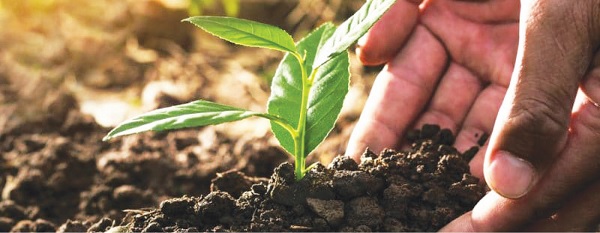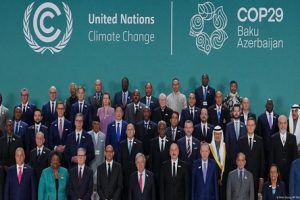
It is necessary to emphasize the role of collaborations among higher education institutions to address the pressing issues of climate change.
Everyone who lives in this world needs to contribute to its sustainability. Climate change is caused by human activities and threatens life on Earth as we know it. With rising greenhouse gas emissions, climate change is occurring at rates much faster than anticipated. Its impacts can be devastating and include extreme and changing weather patterns and rising sea levels.
The impacts of climate change include rising temperatures, rising sea levels, and extreme weather (droughts, flooding, storms.) These impacts can lead to negative effects on the environment and society, such as land degradation, disease, death, and mental health issues.
Sustainability is concerned with protecting the planet, halting climate change, and promoting social development without endangering life on Earth or leaving anyone behind. This concept seeks to cover our present needs without compromising resources for future generations.
Governments, companies, and individuals are becoming aware of the threats to sustainability and are taking action. Awareness by itself is not enough; every stakeholder needs to partake in climate action to ensure the sustainability of our environment.
Ethiopia is committed to playing its part in the global climate agenda. Ethiopia is integrating climate resilience into its national development strategies and actively pursuing green growth pathways.
Ethiopia remains committed to creating an enabling environment for climate finance by implementing policies that promote renewable energy, sustainable agriculture, and reforestation. In the Nationally Determined Contribution (NDC), Ethiopia needs approximately $316 billion to achieve its climate goals by 2030, underscoring the urgent need for mobilizing substantial climate finance from diverse sources.
However, Ethiopia faces several challenges in accessing green and climate finance, both domestically and internationally.
Domestically, government institutions lack the capacity to present cohesive and compelling proposals to international donors and financial institutions, and there are inadequate mechanisms to monitor and report on the impacts of funded projects.
The issue of debt burden also limits access to non-concessional green and climate finance. At the international level, Ethiopia faces the challenge of meeting the cumbersome and stringent requirements set by international financial institutions and climate funds, which can be overwhelming for institutions with limited capacity.
Furthermore, the competition for international green finance is intense, with many developing countries competing for a limited pool of resources. The geopolitical landscape and donor priorities also significantly impact Ethiopia’s ability to secure international green finance.
To overcome these challenges, Ethiopia is working closely with partners to enhance its institutional capacity and coordination to manage and deploy green finance effectively.
The country is creating a policy and institutional environment that incentivizes the participation of the private sector in climate change mitigation and adaptation actions, including in the generation of clean energy. Ethiopia has also embarked on large-scale restoration of degraded landscapes through nature-based solutions under the Green Legacy Initiative (GLI) and is working on a legal framework for sustainable financial mechanisms for the GLI and other degraded landscape programs.
Additionally, Ethiopia is exploring non-traditional sources of finance, such as debt-for-climate swaps, carbon trading, and green bonds. Through diplomatic engagements and processes under the United Nations Framework Convention on Climate Change (UNFCCC), Ethiopia is strongly calling on global financial institutions and donor countries to scale up their support and facilitate access to climate funds for the most vulnerable nations.
Changing Ethiopia’s main energy sources to clean and renewable energy is the best way to stop using fossil fuels. These include technologies like solar, wind, wave, tidal, and geothermal power. Switch to sustainable transport. Petrol and diesel vehicles, planes, and ships use fossil fuels.
The biggest ecological problems facing the world today include climate change, loss of biodiversity, environmental pollution, and environmental degradation. These problems have both local and global impacts, affecting both human beings and the natural environment.
Among many stakeholders who need to partake in climate action, higher education has a significant role to play in guiding society towards a sustainable future through research, community engagement, and by developing the knowledge, skills, and attributes of students so that they are aware of the ecological and climate crises.
Environmental education encourages critical thinking and problem-solving skills. As individuals grapple with real-world environmental challenges, they develop the capacity to devise innovative solutions, contributing to the collective effort to build a sustainable future.
Higher learning institutions are now contributing their share to address the pressing issue of climate change. However, universities, be they private or government, are not able to create alliances to address the pressing climate change issues.
The Ministry of Planning and Development, mandated to lead coordination of environment and climate change issues, is recently hosting a half-day consultative workshop under the theme: “Towards a Greater Engagement of Universities on Climate Change Issues in Ethiopia.”
The workshop brought together university presidents from across the country, representatives from the Ministry of Education, key climate-implementing ministries, and heads of selected research institutes.
Accordingly, the participants are discussing strategies and initiatives developed by Ethiopia to address climate change. This workshop is also believed to serve as a platform for networking and collaboration on the impacts of climate change.
Climate change has been becoming one of the pressing issues in Ethiopia, said State Minister Seyoum Mekonen. For this reason, the government of Ethiopia has embarked on the implementation of Green Legacy Initiative to promote a healthy environment in Ethiopia by restoring ecosystems, mitigating climate change, and fostering environmental awareness.
The initiative has been playing a paramount role in mitigating climate change impacts said the minister mentioning the ‘Bounty of the Basket’ (Yelemat Turifat), a national agricultural development initiative, and summer farming activities are helping the nation’s efforts to put an end to aid dependency in Ethiopia, beyond dealing with climate change.
With the planting billion of seedlings in the past five years, the affected areas have been able to recover. In order to help mitigate the pressure of climate change, the need to engage universities in the areas of capacity building, research, and other activities.
In particular, establishing favorable systems to university scholars that allow their academic work to be utilized as a resource of knowledge for policy development is decisive. He urged universities to contribute and implement the outcomes of innovation and technology to protect cities and regions from the adverse consequences of climate change.
BY STAFF REPORTER
THE ETHIOPIAN HERALD TUESDAY 25 JUNE 2024





